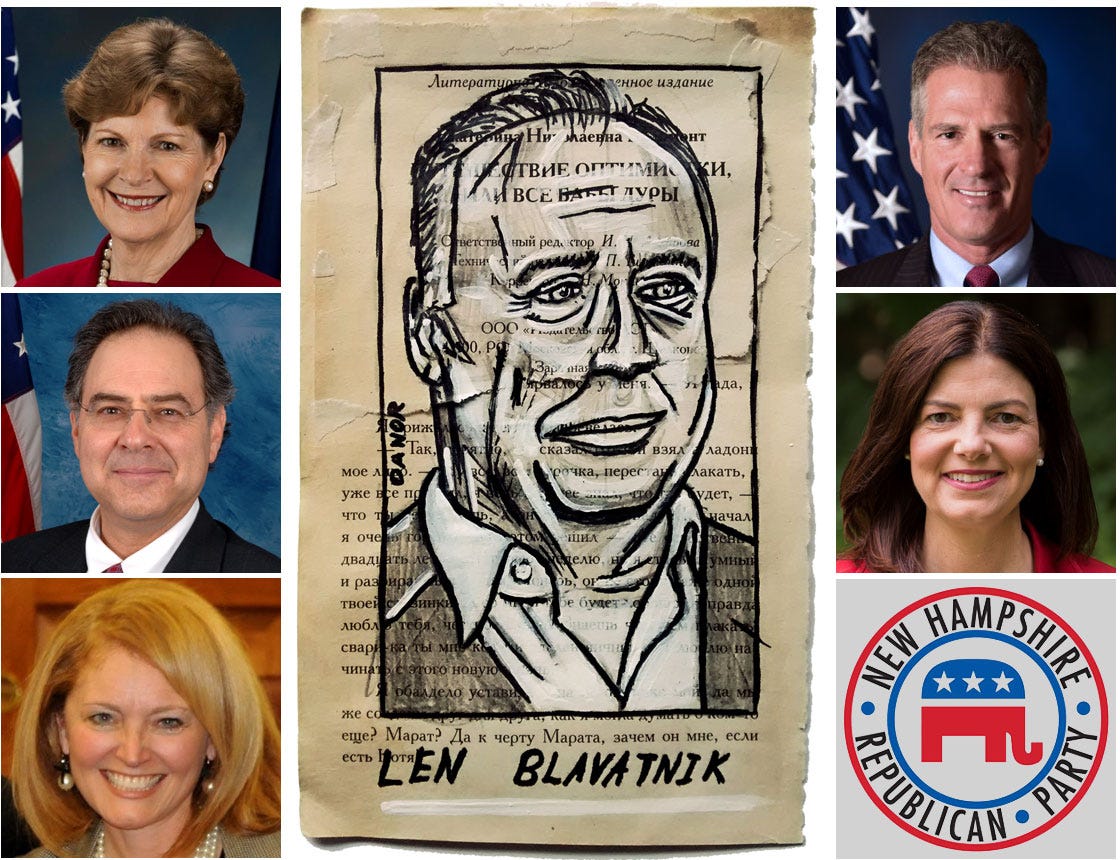Ukrainian-born billionaire under investigation by special counsel gave thousands to NH politicians

A number of prominent New Hampshire politicians, on both sides of the aisle, received thousands of dollars in campaign contributions from a Ukrainian-born billionaire who is reportedly under investigation by Robert Mueller’s team for his 2016 campaign donations to political funds controlled by Donald Trump.
In September, ABC News reported the special counsel’s investigation had begun looking into nearly $2 million in campaign contributions from three Americans with Russian business connections. One of the businessmen is Leonard Blavatnik, a dual citizen of the U.S. and U.K., who is ranked by Forbes as the 40th wealthiest person in the world with a net worth of $21 billion.
After emigrating to the U.S. in 1978 when he was twenty-one years old, Blavatnik obtained U.S. citizenship and earned advanced degrees from Columbia and Harvard Business School. He then returned to Russia, where he made his fortune in the wake of the Soviet Union’s collapse, becoming business partners with Russian oligarchs who now have close ties to President Vladimir Putin.
Viktor Vekselberg, Blavatnik’s classmate from the Moscow Institute of Transport Engineers, has been named the richest man in Russia and reportedly holds frequent meetings with Putin. Blavatnik and Vekselberg built the second largest aluminum business in Russia and then merged it with UC Rusal, Russia’s largest.
Blavatnik continues to hold a minority interest in Rusal and served on its board of directors until Trump’s election. Rusal’s founder and managing partner, Oleg Deripaska, has been called “Putin’s favourite industrialist.” His name previously surfaced in Mueller’s investigation when it was revealed that Trump’s then-campaign manager Paul Manafort had allegedly offered to provide his former client with personal briefings about the campaign.
$1 million to Donald Trump’s inauguration fund
According to data compiled by the Center for Responsive Politics, Blavatnik began making contributions to U.S. politicians in 1996 with relatively modest donations to candidates from both parties.
His first New Hampshire-related contribution was a $2000 donation to Jeanne Shaheen’s first Senate campaign in 2002. Two years later, Blavatnik and his wife Emily made donations to the New Hampshire Republican State Committee totaling $1011.
Blavatnik increased his donations to Granite Staters in the 2010 election cycle with donations to Democratic congressional candidate Katrina Swett ($2400) and both parties’ senatorial candidates, Democratic Congressman Paul Hodes ($4800) and Republican Kelly Ayotte ($2400).
Blavatnik contributed $2500 to then-Massachusetts Sen. Scott Brown for his 2012 reelection bid against Elizabeth Warren. In the 2014 election cycle, he made maximum $5400 donations to both Brown and Shaheen in their senate face-off.
An analysis by the Dallas Morning News noted a dramatic change in Blavatnik’s political contributions for the 2016 election cycle. “Blavatnik’s political contributions soared and made a hard right turn as he pumped $6.35 million into GOP political action committees,” they wrote.
In addition, Blavatnik contributed $1 million to Donald Trump’s inauguration fund. A spokesperson for Blavatnik denied he had donated any money to Trump or his campaign, noting the Presidential Inaugural Committee “has been responsible for organizing the inauguration ceremonies of every U.S. president since 1901.”
Blavatnik’s 2016 contributions included $100,000 to the Republican National Committee’s legal fund that has been used to pay for some of Trump’s legal fees related to the Mueller investigation. After the inauguration, the Wall Street Journal reported Blavatnik donated another $12,700 to the fund.
Putin’s clutches
Unless Blavatnik’s contributions were directed by a foreigner, they do not appear to violate U.S. campaign finance laws. Nevertheless, Rep. Adam Schiff, the ranking Democrat on the House Intelligence Committee investigating Russian interference in the 2016 election, says contributions from American citizens with ties to the Kremlin are of “keen concern.”
“The oligarchs are really part and parcel of service to the Kremlin,” Schiff told ABC News. “They can be called upon at basically Putin’s will to do what he needs done. It gives them some distance from the Kremlin, it gives them some plausible deniability.”
Louise Shelley, director of George Mason University’s Terrorism, Transnational Crime and Corruption Center, agrees. She told ABC News that said she does not believe Blavatnik would have made the large contributions without the Kremlin’s implicit approval. “You can’t be an enormously rich person in Russia, or even hold large holdings in Russia without being in Putin’s clutches,” she said.


